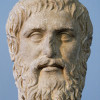“ No man should be a soldier who cannot count, and indeed he is hardly to be called a man. ”
Plato, The Republic. copy citation
| Author | Plato |
|---|---|
| Source | The Republic |
| Topic | soldier |
| Date | |
| Language | English |
| Reference | |
| Note | Translated by Benjamin Jowett |
| Weblink | http://www.gutenberg.org/files/1497/1497-h/1497-h.htm |
Context
“'Yes, certainly.' Then there is something ludicrous about Palamedes in the tragedy, coming in and saying that he had invented number, and had counted the ranks and set them in order. For if Agamemnon could not count his feet (and without number how could he?) he must have been a pretty sort of general indeed. No man should be a soldier who cannot count, and indeed he is hardly to be called a man. But I am not speaking of these practical applications of arithmetic, for number, in my view, is rather to be regarded as a conductor to thought and being. I will explain what I mean by the last expression:—Things sensible are of two kinds;”
source


